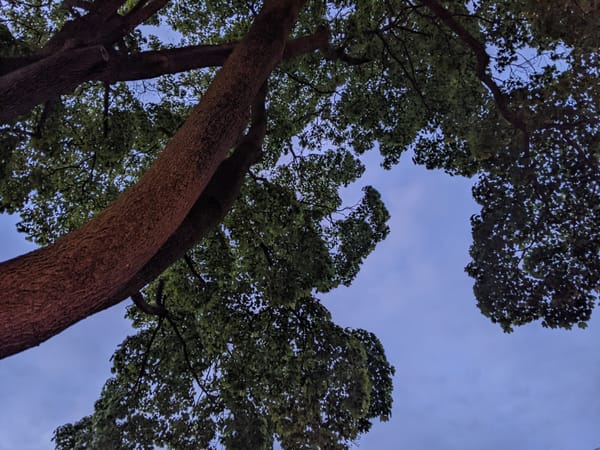Fat allyship in Coaching
An invitation

Transcript of a talk I gave in my coaching class. cw: diets, weight loss, medical terms for describing fat bodies, fat-phobia. This was a 5 minute talk and not an exhaustive discussion on the subject, I link to resources I love below for further exploration. I also want to note that this talk is focused on the connection between health outcomes and weight loss, but I don’t believe that health is a moral obligation.
Hi coaches,
A common example I see used in coaching textbooks when it comes to typical scenarios you might be supporting a client on is weight loss. A part of me shrinks a little whenever I see this, and today I want to talk to you about why.
I identify as fat. Fat, as a neutral descriptor of my body. Thin, tall, short, fat. Fat, as a political descriptor. Anti-diet, Anti-weight loss, Anti-fat shame and abuse. Fat, as a language of love for my body. My strong roly-poly arms, my tummy that jiggles of happiness when I move my body, my thighs pillars that ground me, my chubby face that lights up with the widest grins.
Unfortunately, this comforting language of peace in my body is very new to me. When I was a little kid, there was a joke in the family about me, which probably would be better in Tamil, but translates to, is she a baby or a barrel? I started being told I was too big, I ate too much, my curves were too wide to find clothes for me. Soon I started telling myself, my body is wrong.
For years and years I was in a continuous cycle of going on a diet, losing a little weight, gaining it back no matter how much "maintenance" I did, and constantly searching for the next diet or thing that would bring me my ideal body once and for all. I ate food with guilt, exercised as punishment, and knew nothing but shame for how my body looked, felt and behaved.
One day I was listening to my favorite podcast Call Your Girlfriend, and they had another podcast’s host on, one called She’s all fat. The hosts, Sophie and April talked about bias and discrimination against fat people, and the harmful narratives that exist around fatness. My consciousness was struck. How could I be inclusive and support fat people, and still pursue weight loss? How could I be healthy if I gained weight?
Research shows that contrary to popular belief, fat is blown out of proportion as a health risk, but weight cycling - where dieting causes repeated fluctuation in weight gain and loss - results in inflammation that does harm our health. Mortality data actually shows that folks classified as “overweight” or “moderately obese” have similar longevity compared to folks that are “normal”. From reading the work of fat activists and writers I learnt that body diversity is inherent in humans and we are bound to be of all different shapes and sizes based on our genetics, environment and conditions of survival - that health is not something that we alone have control over - as abundant access to good food, health care, clean air, water are factors controlled by country, race, family, gender, wealth. And in a capitalist system that discriminates against any body that’s outside of the defined norm, it’s so convenient to place the onus of health on us. Fat people shouldn’t be fat. Disabled people shouldn’t be disabled.
In dismantling my own internalized fat-phobia, I became grateful for my body, that had held me through trial and triumph. I started moving my body for my own pleasure. I built bridges with food, food that I love that nourishes me and connects me to the land I am from. I worked with a nutritionist that practices an anti diet, health at every size approach called intuitive eating and worked on restoring joy in my relationship with food. It was life changing. I started to know what it was like to feel at home, free, liberated in my own body.
I wish for all of us and our clients to have access to feeling liberated in our bodies, which is not something I believe the endless pursuit of weight loss can give us. That said, it’s also important to remember that diet culture is so deeply embedded in us and we need to meet people where they are on their own journey. We could start by learning from the generous wisdom of writers and activists that challenge ableist and fat-phobic systems we live in and offer kinder and radical alternatives. We can take care in noticing what assumptions we are making about fat clients, and challenge the messages in our culture that fat folks might be lazy or unhealthy. And we can consider what resources we are sharing and questions we are asking them and make sure that weight related outcomes are not part of them. When the topic of weight loss or diets come up, we could avoid setting goals around weight loss. Instead we could understand what outcomes they seek for their body and explore how to achieve them by including their relationship with their body, food, possible histories of eating disorders or chronic illnesses or trauma in the conversation. I also invite you to look up health at every size practitioners that are nutritionists, therapists, personal trainers that might be able to support your clients in the outcomes they are seeking.
I wish you all pleasure and peace in your bodies. Thank you for listening. I've put together this list of resources if you would like to explore this subject further.
Resources
Approaches
- Health at Every Size professionals https://asdah.org/haes-professional/
- Intuitive eating https://www.intuitiveeating.org/10-principles-of-intuitive-eating/
Books
- Fearing the Black Body - Racist origins of Fatphobia https://nyupress.org/9781479886753/fearing-the-black-body/
- The Body is not an apology https://www.penguinrandomhouse.com/books/565139/the-body-is-not-an-apology-second-edition-by-sonya-renee-taylor/
- Anti-Diet https://christyharrison.com/book-anti-diet-intuitive-eating-christy-harrison
Podcasts
- Maintenance Phase https://www.maintenancephase.com/
- She’s All Fat https://shesallfatpod.com/
Instagram Favorites
More Resources




